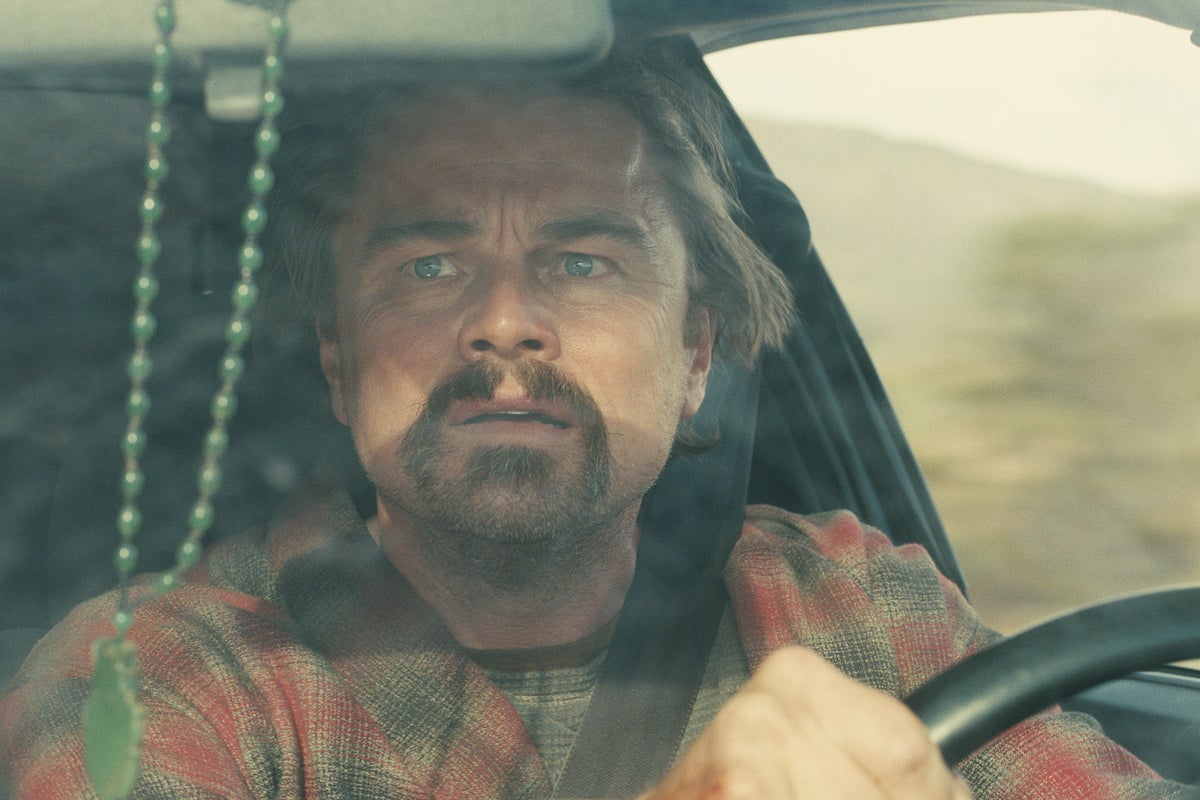What’s to be done when the revolution fails, but the revolutionary lives on? Do they pickle themselves in some quiet place and watch their tainted world roll by? Or do they turn, graciously, to the next generation and say, “Maybe you will be the one to put this world to right”? It’s the phrase that brings Paul Thomas Anderson’s One Battle After Another to its emphatic, timely conclusion. For all its scale, and swaggering sense of power, it’s a film that recognises with clarity what it means to exist as an entire human being under the hand of white supremacy. To resist is to live and to live is to resist.
There will be a lot of talk in the coming months about whether this is Anderson’s masterpiece. I’m not convinced it’s his best film – there’s something about The Master (2012) that I’ve never been able to shake. But, for Anderson, it’s as definitive an artist’s statement as Quentin Tarantino’s Once Upon a Time in Hollywood, though he’s looking resolutely forward where his contemporary looked back.
Anderson’s entire body of work, from Boogie Nights (1997) and Magnolia (1999) to There Will Be Blood (2007) and Phantom Thread (2017), has operated with the same orchestral-flourish confidence – what feels different, this time, is the investment. He’s tinkered away at the idea for around 20 years, in part out of a fruitless desire to adapt Thomas Pynchon’s free-flowing novel Vineland. And he’s ended up at Warner Bros, shooting on 70mm film and with a reported $130m budget, a release in VistaVision and IMAX, and Leonardo DiCaprio as his star.
This is, in short, Anderson’s action epic. It opens with the blistering, capital “C” Cinema image of Perfidia Beverly Hills (Teyana Taylor, magnificent in every scene she inhabits) as she struts into an immigration detention centre –righteous fury in her muscles, looking like she stands about 12 feet tall –declaring to a humiliated Colonel Steven J Lockjaw (Sean Penn), “this is an announcement of a motherf***ing revolution”.
We then blast through several more exploits of the French 75, a radical group consisting largely of Black women plus DiCaprio’s Bob, who’s well-meaning and utterly infatuated with Perfidia. Editor Andy Jurgensen works at a ferocious pace, and the film’s momentum holds up even as the French 75 disbands, Perfidia disappears, and Bob is left to raise their daughter Willa (Chase Infiniti, in her screen debut).
We can rely, instead, on the electric cool of Benicio del Toro’s Sergio St Carlos, a karate teacher who runs an underground network helping undocumented immigrants. Or we can fear Lockjaw, who Penn plays as a twitchy, teeth-grinding cartoon with just enough of a heartbeat to feel like a palpable threat – his sexual obsession with Perfidia becomes an obstacle to his induction into the white supremacist secret society the Christmas Adventurers. He acts swiftly and ruthlessly. A climactic car chase sees the pursuer rise and fall beneath the crests of an undulating road like the shark in Jaws on the hunt.

Anderson’s tackled Pynchon before, in 2014’s dope-dream Inherent Vice. Here, he takes very little from Vineland bar the outlines of its characters and incidents. The author still feels good in his hands. Even when their styles diverge, they share an Olympian gymnast’s flexibility when it comes to tone. DiCaprio is playing a brand of character he’s finessed beautifully of late, the buffoon with a broken heart, who totters around One Battle After Another’s midsection in a bathrobe and a tiny hair bun, wielding a phone charger in search of an outlet and throwing a toddler’s tantrum when he realises he’s forgotten the secret revolutionary passcode.
The actor’s an accomplished clown when it’s required of him, but Anderson can easily break away from him, for a moment, to watch a planted agitator roll up to a protest and give the cops an excuse for violent suppression, and let the audience feel that chill of malevolent power crawl up their limbs. The director’s work often has a taut, haunted feeling about it, even when he’s rolling around in the hippiest, more ramshackle spaces of America, and he never lets his audience forget the kind of inequality of power and resources at play when it comes to the resistance and the systems it’s fighting against.
You can feel it in Taylor’s performance, in the cracks in Perfidia’s armour, and in the distance between father and daughter; in the old revolutionary who chose to give up and live in fear, and in the daughter who inherited the fire. For all of One Battle After Another’s formalist pleasures –its humour, its pace, its grandeur – what feels the most striking about it, in this apocalyptic now, is the hope that it chooses to leave us with. Every battle, out on the streets and inside hearts, will have been worth it one day.

Watch Apple TV+ free for 7 day
New subscribers only. £9.99/mo. after free trial. Plan auto-renews until cancelled.
Try for free
ADVERTISEMENT. If you sign up to this service we will earn commission. This revenue helps to fund journalism across The Independent.

Watch Apple TV+ free for 7 day
New subscribers only. £9.99/mo. after free trial. Plan auto-renews until cancelled.
Try for free
ADVERTISEMENT. If you sign up to this service we will earn commission. This revenue helps to fund journalism across The Independent.
Dir: Paul Thomas Anderson. Starring: Leonardo DiCaprio, Teyana Taylor, Chase Infiniti, Sean Penn, Benicio del Toro, Regina Hall. 15, 162 minutes.
‘One Battle After Another’ is in cinemas from 26 September

